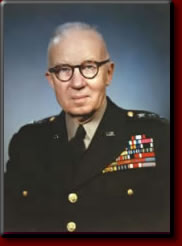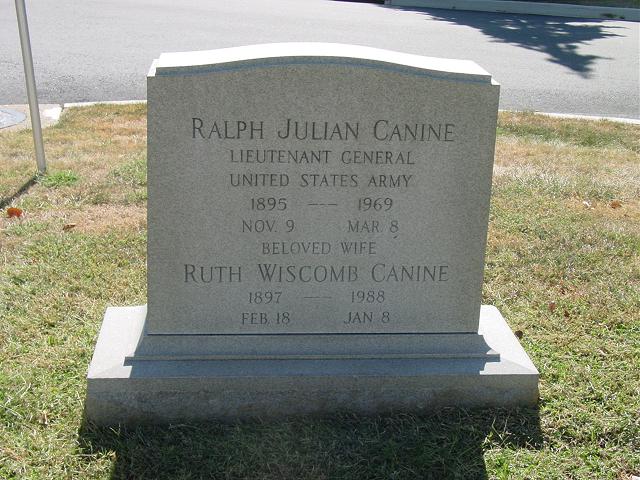Courtesy of the National Security Agency:
Ralph J. Canine
LTG, USA
1895-1969
(1999 Inductee)
Lieutenant General Ralph J. Canine, NSA's first director, is known today as the Great Unifier – the man who, almost single-handedly, forced cryptologic unification on the Services. His term at NSA, from 1952 to 1956, became the crucible for cryptologic centralization. He departed the Army and NSA a figure of mythic stature. Had Canine not been the director, NSA might not have survived the end of the decade.
Canine was born in 1895 (the only Director from the Nineteenth Century) in Flora, Indiana, one of two children of the local superintendent of schools. When he left home, he was intent on being a doctor, and had completed pre-med studies at Northwestern University when he entered World War I as an Army second lieutenant. He knew immediately that the Army would be his life, and never had a second thought about a medical career. He served in various combat posts in France, and elected to stay in the Army after the armistice was signed in 1918.
The interwar period (1919-1941) was his education, when he traveled from one Army post to another, filling just about any job that was vacant.
When World War II broke out, Canine was well fitted for responsibility. He became the Chief of Staff for the XII Corps, which served in George Patton's Third Army during its historic race across France in 1944. After the war he was rewarded with command of the First Infantry Division, one of the most prestigious of Army jobs.
In 1951 Canine became director of the Armed Forces Security Agency, which was America's first tentative step toward cryptologic unification. He was there long enough (one year) to see what the organization lacked. When President Truman created NSA in 1952, Canine continued as its first director.
The gruff, no-nonsense Army general was just what the new organization needed. He ruthlessly squashed dissent among the services, forcing them into a centralized system. But if he appeared autocratic to his opponents, to the NSA workforce he was a hero. He increased hiring, created an elevated civilian grade structure with better promotion opportunities, sent NSAers to senior service schools, initiated the college tuition payment program, worked for congressional passage of new hiring and security authorities, and forged ahead with the plan to move NSA out of borrowed quarters at Arlington Hall and Naval Security Station, and into its own new building at Fort Meade.
Canine never occupied the Director's office at Fort Meade, but everyone knew who was responsible for it, and when a new building (headquarters building) was opened in 1963, Canine did the dedication. He died unexpectedly of a pulmonary embolism in 1969.
NOTE: The General's son, Ralph J. Canine, Jr., Lieutenant Colonel, United States Army, is also buried in Arlington National Cemetery.
Michael Robert Patterson was born in Arlington and is the son of a former officer of the US Army. So it was no wonder that sooner or later his interests drew him to American history and especially to American military history. Many of his articles can be found on renowned portals like the New York Times, Washingtonpost or Wikipedia.
Reviewed by: Michael Howard


